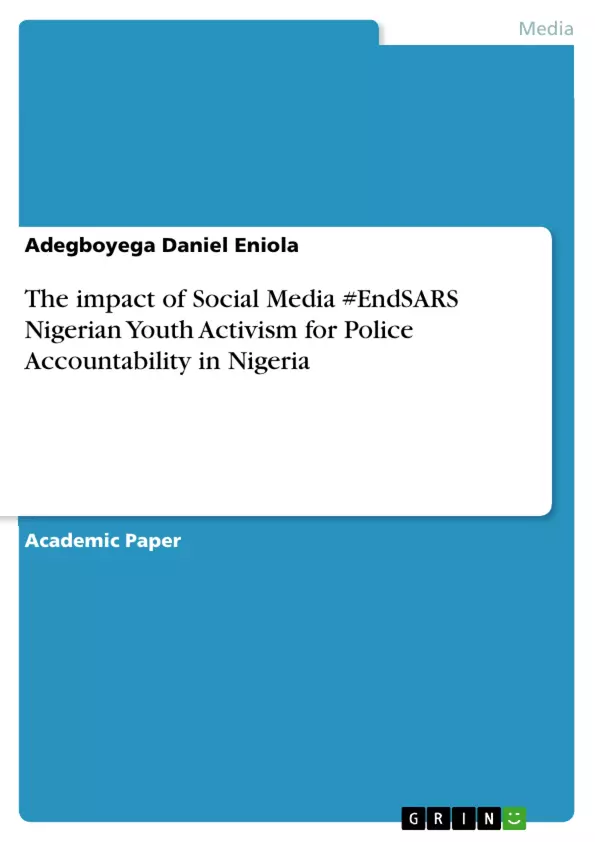This article reveals how Nigerian youths reacted to the tragic shooting of a Nigerian man by agents of the Special Anti-Robbery Squad, a unit of the Nigerian Police Force (NPF), in Delta State, Nigeria. Between November 2017 and October 2020, series of vibrant online and physical protests organized under the hashtag of #EndSARS campaign was staged against the operation of the Special Anti-Robbery Squad (SARS) for their abuse of power which indicates police brutality in Africa’s most populous country.
Thus, this article examined the factors that led to the outburst of the #EndSARS protest as a strategic means for seeking police accountability, that represent the youths capacity to plan, organize, execute, assemble and persuade the Nigerian Government to act and the impact of the mass action on policing and law enforcement in Nigeria. The methodology postulated for this study consists of a qualitative analysis of tweets between September 11 and October 11, 2020.
Inhaltsverzeichnis (Table of Contents)
- Introduction
- Nigerian youths #EndSARS protest: A brief background
- Digital mobilization & Fundraising
Zielsetzung und Themenschwerpunkte (Objectives and Key Themes)
This article examines the role of social media in the #EndSARS protests in Nigeria, focusing on how young people used these platforms to mobilize, organize, and advocate for police accountability. The article aims to analyze the effectiveness of social media as a tool for influencing government policies and decision-making processes in Africa and globally.
- The impact of social media on the #EndSARS protests
- The use of social media for mobilization and fundraising
- The strategies employed by Nigerian youths to influence government policies
- The effectiveness of digital activism in promoting social and political change
- The role of social media in shaping public discourse and awareness regarding police brutality
Zusammenfassung der Kapitel (Chapter Summaries)
Introduction
This section introduces the topic of social media's role in activism, highlighting its growing influence in various spheres of life, particularly in Africa. The article specifically focuses on the #EndSARS protests in Nigeria, examining how social media platforms like Twitter, Facebook, WhatsApp, and Instagram were used to organize and amplify the movement.
Nigerian youths #EndSARS protest: A brief background
This chapter provides a background on the #EndSARS movement, outlining the issues of police brutality and the history of the Special Anti-Robbery Squad (SARS) in Nigeria. It discusses the events leading up to the protests, including the shooting of a young man in Ughelli, Delta State, which ignited public outrage. The chapter also delves into the lack of accountability within the Nigerian Police Force and the need for police reforms.
Digital mobilization & Fundraising
This chapter examines how social media facilitated the mobilization and coordination of the #EndSARS protests. It highlights the use of various social media platforms to spread information, organize gatherings, and raise funds for the movement. Examples of tweets from individuals and organizations are presented, demonstrating the extent of social media's influence in bringing together protesters from different locations within Nigeria and globally.
Schlüsselwörter (Keywords)
This article focuses on the intersection of social media, activism, and police accountability in Nigeria. Key terms include #EndSARS, social media, activism, police brutality, SARS, Nigeria, digital mobilization, fundraising, and government policy.
- Quote paper
- Adegboyega Daniel Eniola (Author), 2022, The impact of Social Media #EndSARS Nigerian Youth Activism for Police Accountability in Nigeria, Munich, GRIN Verlag, https://www.hausarbeiten.de/document/1336698


